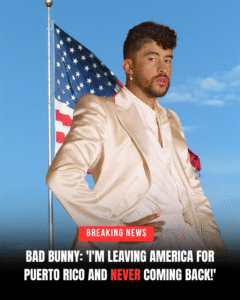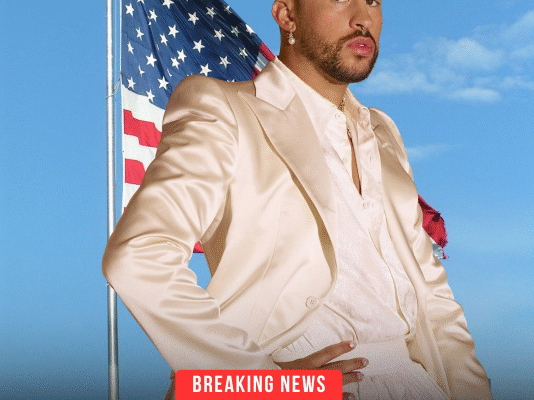
That headline—“SH0CK: After NFL CANCELS Bad Bunny’s Super Bowl 2026 Performance…”—is pure viral bait. But here’s the twist: it’s not true. The NFL has not canceled Bad Bunny’s halftime show. In fact, he’s still slated to headline Super Bowl LX in February 2026 at Levi’s Stadium in Santa Clara, California. What’s unfolding instead is a cultural flashpoint—a collision of music, politics, identity, and misinformation.
🎤 The Announcement That Lit the Fuse
On September 28, 2025, the NFL officially announced that Puerto Rican superstar Bad Bunny would headline the Apple Music Super Bowl LX Halftime Show. It was a landmark moment: a Spanish-language artist, born and raised in Vega Baja, Puerto Rico, chosen to perform on one of the most-watched stages in the world. Bad Bunny, real name Benito Antonio Martínez Ocasio, called it a victory for “my people, my culture, and our history”.
Jay-Z, whose Roc Nation is producing the halftime show, praised Bad Bunny’s impact: “What he’s done and continues to do for Puerto Rico is truly inspiring. We are honored to have him on the world’s biggest stage”.
But not everyone saw it as a celebration.
🔥 MAGA Backlash and ICE Threats
Almost immediately, conservative commentators and MAGA influencers erupted in outrage. Homeland Security Secretary Kristi Noem declared that the NFL “won’t be able to sleep at night” over its decision. She and others warned that Immigration and Customs Enforcement (ICE) agents would be present at the Super Bowl, raising concerns that the event could become a flashpoint for immigration enforcement.
Corey Lewandowski, a former Trump adviser, stated bluntly: “There is nowhere you can provide safe haven to people in this country illegally. Not the Super Bowl and nowhere else”.
Bad Bunny’s past comments resurfaced. In an interview with i-D Magazine, he explained why he had avoided performing in the mainland U.S.: “(Expletive) ICE could be outside.” He emphasized that his decision wasn’t rooted in hate, but in concern for his fans—especially Latinos and Puerto Ricans living in the U.S..
🌀 The Misinformation Storm
As the backlash grew, so did the rumors. Social media lit up with viral posts falsely claiming that the NFL had canceled Bad Bunny’s performance. Headlines like “BREAKING: The Super Bowl Halftime Show featuring Bad Bunny has been OFFICIALLY canceled” spread rapidly.
But these claims were entirely false. There has been no official cancellation. The halftime show remains scheduled as planned.
This misinformation storm reflects a broader trend: how viral outrage, amplified by political polarization, can distort reality. It’s not just about music—it’s about identity, belonging, and who gets to take center stage.
🇵🇷 Puerto Rico, Politics, and Performance
Bad Bunny’s selection is deeply symbolic. Puerto Rico is an unincorporated U.S. territory, often treated as peripheral in American politics. Yet here was a Puerto Rican artist, singing in Spanish, claiming the Super Bowl stage.
His music—reggaeton, Latin trap, and socially conscious lyrics—has long been a vehicle for cultural pride and political critique. His recent album, “DeBÍ TiRAR MáS FOToS,” is a love letter to his island. His refusal to tour the mainland U.S. during that album’s release was a statement of solidarity with his community.
In this context, the Super Bowl performance isn’t just entertainment. It’s a declaration: Puerto Rican identity is American identity. Spanish is part of the American soundscape. And Bad Bunny is not just a performer—he’s a symbol of resistance, resilience, and representation.
🧠 Why the Outrage Matters
The backlash against Bad Bunny reveals deeper anxieties. Conservative voices questioned whether he “screams American football,” accusing the NFL of promoting “woke propaganda”. But this critique misses the point.
The Super Bowl halftime show has always been a mirror of cultural shifts. From Beyoncé’s Black Panther-inspired performance to Shakira and J.Lo’s Latin-infused spectacle, it reflects who America is—and who it’s becoming.
Bad Bunny’s presence challenges narrow definitions of Americanness. It asks: Can a Spanish-speaking artist from Puerto Rico headline America’s biggest sports event? The NFL’s answer is yes. The backlash says no.
And that tension is precisely why this moment matters.
🧩 The Role of Media and Misinformation
The false claims of cancellation are a case study in how misinformation spreads. A few viral posts, amplified by outrage, can override official statements and real reporting. In this case, the truth—that Bad Bunny is still performing—was drowned out by the noise.
This isn’t just a media problem. It’s a cultural one. When people are primed to believe the worst, especially about artists who challenge their worldview, facts become secondary. Emotion takes over. And in that emotional fog, even a Super Bowl performance becomes a battleground.
💔 The Emotional Undercurrent
For Bad Bunny, the stakes are personal. His art is rooted in emotional authenticity. He’s spoken openly about mental health, identity, and the pressures of fame. His decision to perform at the Super Bowl, despite past concerns about ICE, is a gesture of courage and connection.
The false narrative that he’s “leaving America forever” taps into a deeper fear: that artists who speak truth to power will be silenced, exiled, or erased. But Bad Bunny isn’t leaving. He’s showing up. Loudly, proudly, and unapologetically.
🌎 What This Means for the Music Industry
Bad Bunny’s Super Bowl performance is a watershed moment for Latin music. It signals that Spanish-language artists are not just niche—they’re mainstream. It challenges the industry to rethink who gets the spotlight, and why.
It also raises questions about safety, politics, and artistic freedom. Can artists perform without fear of government retaliation? Can music be a space for protest and celebration? Bad Bunny’s journey suggests that it can—and must.
🕊️ Final Thoughts: A Ritual of Witnessing
This story isn’t just about a halftime show. It’s about communal witnessing. About how a viral headline—true or false—can become a ritual of reflection. About how we, as a culture, respond to rupture with meaning-making.
Bad Bunny’s performance will be more than music. It will be a moment of healing, defiance, and visibility. And whether you’re watching from Puerto Rico, the mainland U.S., or anywhere else, it will be a reminder: art can transform outrage into connection.

